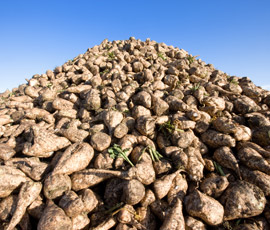Cold weather ‘triggered sugar beet problems’

Exceptionally cold weather played a major part triggering emergence problems with this year’s sugar beet crops, scientists have concluded.
Poor germination was caused by a number of interacting factors – rather than any single cause – but cold weather had a big role, said the British Beet Research Organisation.
Growers across eastern England reported problems with sugar beet establishment this spring, including crops that failed to establish properly.
The BBRO reported its findings after a five-month investigation which included a series of independent studies to uncover the reason for erratic crops.
During the sowing period from which most complaints originated – 20 March to 8 April – the air temperature was, on average, 6C colder than the long-term average, it said.
“Overall, the BBRO believes that the 2013 emergence issues have been caused by a number of interacting factors,” said a BBRO bulletin issued on Friday (4 October).
“But the prevailing weather during the sowing period has played a significant role in triggering these problems as also seen throughout northern Europe.”
Studies were based and designed around sugar beet samples and comments received by the BBRO from growers, agronomists and British Sugar area managers.
The BBRO said it did not analyse all varieties and their respective treatments, but concentrated on seed lots where issues were identified via the British Sugar complaints process.
All 2013 commercial seed supplied to growers – as agreed by the NFU and British Sugar – was Xbeet Plus processed by British Sugar subsidiary Germains.
It was unfortunate there were no equivalent batches of Xbeet treated seed for direct comparison in the studies, said the BBRO.
“Scientifically, this is disappointing, but we have tested and have had access to everything that was commercially available,” it said.
“Decreasing temperature increased the number of abnormal seed types, including the twisted hypocotyl and black root tip phenomenon.”
The percentage of abnormal seedlings varied between varieties, their bulks and final processed seed, according to the studies.
In one particular grower sample, the number of abnormal seedlings counted was double (40%) that of an equivalent retained sample (21%) from Germains.
Variations were seen in germination speed.
But there were no differences in the final percentage germination of non-commercial batches of seed varieties Cayman, Pasteur or SY Muse when treated with either Xbeet or Xbeet Plus.
Further tests were commissioned that allow seeds to germinate on filter paper suspended in water tanks so that roots could grow unimpeded to a depth of 30cm.
These tests continue but to date had resulted in more abnormal seedlings than in the standard germination tests – and were evident at 18C.
The BBRO said it was working with Weatherquest to analyse all complaints data against a range of weather and soil variables to understand the impact of cold, dry seed-bed conditions.
“We are aware though of emergence issues with several redrilled crops in late April and early May following wind blow.”
Seed-beds were often challenging to produce, although the very dry period during March and early April helped to produce a fine tilth for sowing spring crops.
As sugar beet crops are lifted this autumn, the BBFO said it was assessing UK fields that had experienced emergence issues earlier in the season for root shape.
The BBRO said it believed all seed should undergo cold temperature tests as well as standard tests to identify any potential issues under cold stress.
But it said this would have implications for commercial seed processing and its on farm delivery.
Further samples should be kept throughout the seed processing procedure so lots can be re-evaluated when issues arise such as experienced in 2013, the BBRO suggested.
Turning to the future, it said further studies were required to investigate the relationship between overall seed size, its embryo and the impact on germination under stress conditions.
“Further germination tests are on-going to reconfirm these findings and the BBRO will be recommending a series of pellet trials in 2014.
“BBRO will continue to ensure that all new technologies are tested robustly and independently before being released to industry to give confidence to all.”
A full summary of the studies is expected to be presented at the BBRO Winter Conference, which is due to take place on 5 February 2014.
Report due on malformed beet

